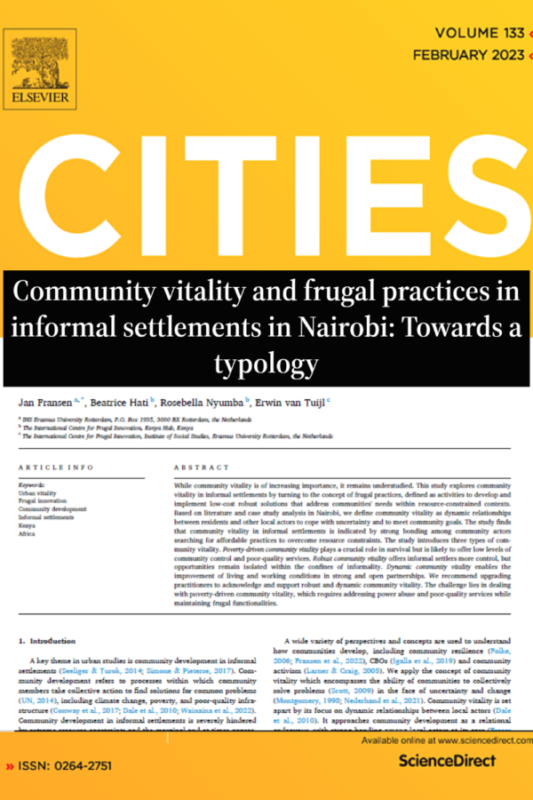- Version
- Download 56
- File Size 641.97 KB
- File Count 1
- Create Date January 28, 2025
- Last Updated March 24, 2025

Community vitality and frugal practices in informal settlements in Nairobi: Towards a typology
Posted by
Nuvoni
- Post Date
- Comments
No Comments
While community vitality is of increasing importance, it remains understudied. This study by Jan Fransen, Beatrice Hati, Rosebella Nyumba, Erwin van Tuijl explores community vitality in informal settlements by turning to the concept of frugal practices, defined as activities to develop and implement low-cost robust solutions that address communities’ needs within resource-constrained contexts.
Based on literature and case study analysis in Nairobi, they define community vitality as dynamic relationships between residents and other local actors to cope with uncertainty and to meet community goals. The study finds that community vitality in informal settlements is indicated by strong bonding among community actors searching for affordable practices to overcome resource constraints.
The study introduces three types of community vitality.
Poverty-driven community vitality plays a crucial role in survival but is likely to offer low levels of community control and poor-quality services.
Robust community vitality offers informal settlers more control, but opportunities remain isolated within the confines of informality.
Dynamic community vitality enables the improvement of living and working conditions in strong and open partnerships. The authors recommend upgrading practitioners to acknowledge and support robust and dynamic community vitality. The challenge lies in dealing with poverty-driven community vitality, which requires addressing power abuse and poor-quality services while maintaining frugal functionalities.
The first objective of the paper is to describe community vitality in informal settlements, by turning to the concept of frugal practices. The second objective is to identify different types of community vitality in informal settlements.
community-vitality-and-frugal-practices-in-informal-settlements-in-nairobi-towards-a-typology
- Authors
- Jan Fransen
- Beatrice Hati
- Rosebella Nyumba
- Erwin van Tuijl
- Submition Date
- Jan 2023
Download


